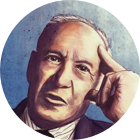
PORTRAIT OF A LEADER
Peter Drucker
The Pragmatic Leader
If you manage others, or have a manager overseeing you, chances are—whether you realize it or not—your tasks and responsibilities have been analyzed by Drucker. If you’re a bad manager, he’s written about your bad habits. If you’re a great manager, he’s written about the great results you produce. If you want to manage anyone (including yourself) with effectiveness, give careful credence to Drucker’s strategies—his wisdom will serve you well.
Peter Drucker is heralded as the Father of Modern Management. He is a fine representation of the Rational-Mastermind-INTJ. We also refer to this type as the Pragmatic Leader. They represent less than 2% of the general population, but they arguably are among an elite group who make the greatest impact in the world.

Pragmatic Leaders provide keen insights because of their macro perspective.
Generally, when you encounter someone conducting research, you will find that they are researching in a particular field. Drucker’s research on management was conducted before the field we now call Management ever existed. He was the first to systematically analyze, interpret, and codify insights on how to manage for results. Through his pioneering work, he provided a foundation for every author, professor, consultant, and student of the field. One management professor has said of him, “It is frustratingly difficult to cite a significant modern management concept that was not first articulated, if not invented, by Drucker, I say that with both awe and dismay.” Drucker’s seminal work, “The Practice of Management” (1954), dissected the American corporation like no other book had ever done before. When remarking on his reason for writing the book, he said, “I wrote ‘The Practice of Management’ because there was no book on management. I had been working for 10 years consulting and teaching, and there simply was nothing or very little. So I kind of sat down and wrote it, very conscious of the fact that I was laying the foundations of a discipline.” From that point, the rest is history.
Pragmatic Leaders articulate concepts which others have a hard time describing.
In our current day and age, one can walk into any major bookstore and find hundreds of books on management, leadership, and business strategy. Thousands of studies have been published on the great institutions of the 20th and 21st century, outlining best practice principles and methods for effectiveness. What makes Peter F. Drucker extraordinary is that if you were to pick up one of his books today, you would find strategies which are insightful, practical, actionable, and extremely relevant for our times. But, what sets Drucker apart as a “one-of-a-kind” is the fact that he wrote his ideas during a time when no one else was writing on the subjects he addressed. Fortune Magazine has said of him, “Drucker’s ideas continue to display a force and resonance that leave him pretty much in a class by himself.”
Pragmatic Leaders are able to accurately predict future outcomes based on present keen observatioNs.
Over a span of more than seven decades, Drucker provided strategies to the “Kings” of the world’s greatest organizations. He realized that the role of the King is an enormous, daunting responsibility—he knew the role so well, yet he never took on the role for himself. Instead, he quietly observed as an active bystander, searching for principles, methods, and strategies for effectiveness. And because of his attentive journey, we are left with his intellectual handprints on the fabric of our society. How do you measure the impact of a man whose ideas are embedded in the very ways that corporations worldwide are organized? At the most basic level, Drucker’s impact extends to anyone of us who has ever worked for an organization. Through his keen observations, Drucker was able to predict what the workplace would look like before it ever existed in its present form.
Pragmatic Leaders clarify their strategies for others through their writings and teachings.
During his lifetime, Peter Drucker wrote 39 books. He wrote more articles for the prestigious Harvard Business Review than anyone in the history of its publication. His ideas have been featured in the Wall Street Journal more times than any other columnist. Business Week referred to Drucker as, “Our most enduring commentator on the practice of management and the economic institutions of society.” He earned 25 honorary doctorates from American, Belgium, Czech, English, Spanish, and Swiss Universities. He was inducted into practically all of the esteemed “halls of fame” (including the U.S. Business Hall of Fame, the Outsourcing Hall of Fame, the Management Hall of Fame, the Coaching Hall of Fame, and the Mentor Hall of Fame—to name only a few). In 2002, Drucker was awarded the Presidential Medal of Freedom by U.S. President George W. Bush.
Pragmatic Leaders are masterful at advising organizational leaders.
There is a saying that goes, “In the land of the blind, the one eyed man is king.” Perhaps the untold part of the story is that in the King’s Counsel room, there resides the King’s Chief Strategist who can see with two eyes. During his lifetime, no other human being has been called upon more often for advice, by Presidents and CEOs of the most successful organizations than Peter Drucker. It would not be an exaggeration to say that no other thought leader has single handedly contributed more to the study of organizational management than Drucker. He is considered to be, “the world’s most widely read and influential thinker on business and management.” And he is unequivocally heralded as the “father of modern management.” Jack Welch, the legendary Chairman of General Electric stated, “The world knows he was the greatest management thinker of the last century.”
